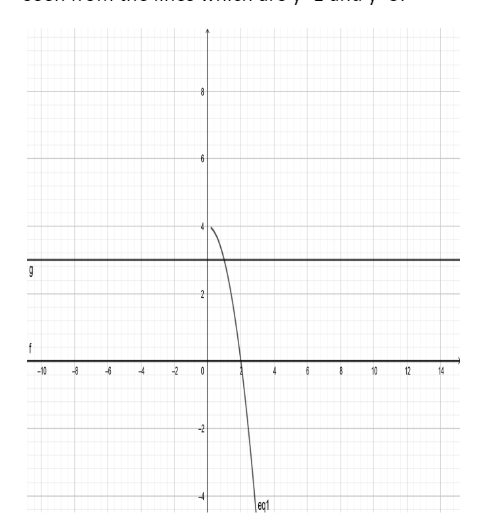Question
Question: Find the area bounded by the curve \[y=\left( 4-{{x}^{2}} \right)\], the y-axis and the lines y= 1 a...
Find the area bounded by the curve y=(4−x2), the y-axis and the lines y= 1 and y=3.
Explanation
Solution
Hint: Use the fact that the area bounded by the curve y = f(x), the x-axis and the ordinates x = a and x= b is given by ∫ab∣f(x)∣dx.
Complete step-by-step answer:
Hence, in this question, we are asked to find the area bounded by the curve y=(4−x2) and the y-axis which means that the region between the abscissas y=a and y=b, hence we can manipulate the above mentioned fact as follows
The area bounded by the curve x = f(y), the y-axis and the abscissas y = a and y= b is given by ∫ab∣f(y)∣dy.
Now, we can write the curve as function of y as follows
& \Rightarrow y=\left( 4-{{x}^{2}} \right) \\\ & \Rightarrow {{x}^{2}}=4-y \\\ & \Rightarrow x=\pm \sqrt{4-y} \\\ & \Rightarrow f(y)=\pm \sqrt{4-y} \\\ \end{aligned}$$ Now, we can simply take the value of f(y) to be as positive by looking at the figure. Hence the required area is given by $\int_{a}^{b}{f(y)dy}$. As mentioned in the question, we have to find the area of the region that is bounded by the curve from the above and the y-axis from the lower side between the two abscissas 1 and 3 which can be seen from the lines which are y=1 and y=3.  Hence, the values of y are 1 and 3 and these are the values of a and b respectively. Now, we can simply form the integral as follows to get the required area of the region. $$\begin{aligned} & \Rightarrow Area=\int_{a}^{b}{f(y)dy} \\\ & \Rightarrow Area=\int_{1}^{3}{\sqrt{\left( 4-y \right)}dy} \\\ & \Rightarrow Area=\int_{1}^{3}{{{\left( 4-y \right)}^{\dfrac{1}{2}}}dy} \\\ & \Rightarrow Area=\left[ \dfrac{{{\left( 4-y \right)}^{\dfrac{3}{2}}}}{\dfrac{3}{2}} \right]_{1}^{3} \\\ & \Rightarrow Area=\left[ \dfrac{{{\left( 4-3 \right)}^{\dfrac{3}{2}}}}{\dfrac{3}{2}}-\dfrac{{{\left( 4-1 \right)}^{\dfrac{3}{2}}}}{\dfrac{3}{2}} \right] \\\ & \Rightarrow Area=\left[ \dfrac{{{\left( 1 \right)}^{\dfrac{3}{2}}}}{\dfrac{3}{2}}-\dfrac{{{\left( 3 \right)}^{\dfrac{3}{2}}}}{\dfrac{3}{2}} \right] \\\ & \Rightarrow Area=\left[ \dfrac{2\left( 1-{{\left( 3 \right)}^{\dfrac{3}{2}}} \right)}{3} \right] \\\ \end{aligned}$$ (as we know that the integral of $${{x}^{n}}$$ is as follows $$\int{{{x}^{n}}dx=\dfrac{{{x}^{n+1}}}{n+1}}+c$$ Where c is the constant of integration ) Hence, we have Total area $$=\left[ \dfrac{2\left( 1-{{\left( 3 \right)}^{\dfrac{3}{2}}} \right)}{3} \right]$$ square units Note: The students can make an error if they don’t know the basic concepts of integration as without knowing them one could never get to the correct answer. As in this question, it is very important to know the following result beforehand The integral of $${{x}^{n}}$$ is as follows $$\int{{{x}^{n}}dx=\dfrac{{{x}^{n+1}}}{n+1}}+c$$ (Where c is the constant of integration)